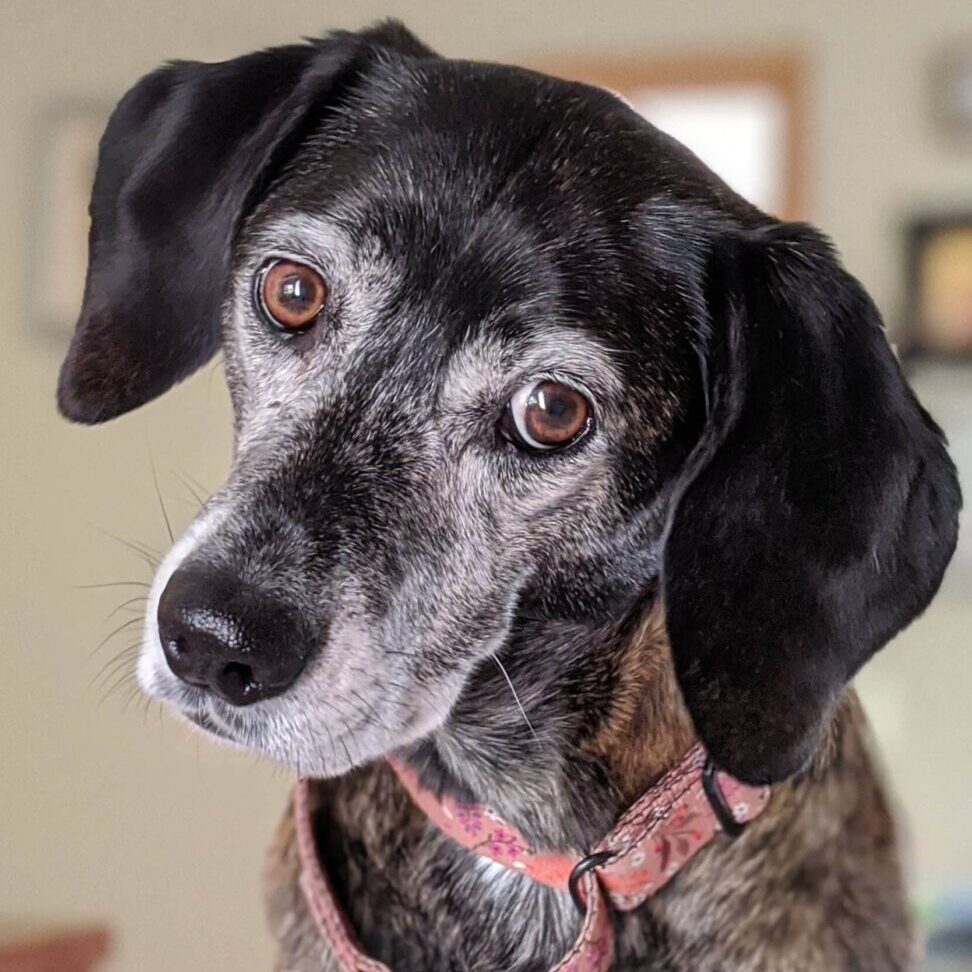Ask Dr. B
Hey Dr. B, why does my dog suddenly have a head tilt?

When your dog tilts their head it is the most endearing gesture, and often means they are paying attention to what you are saying. However, when your dog suddenly develops a permanent head tilt, perhaps along with stumbling, falling, or drooling that could be a sign of a medical condition called vestibular disease.
The Vestibular system helps us with balance and knowing which way is up
Dogs, cats, humans, and all other mammals have a brain system called the vestibular system that controls our sense of balance, direction, and posture. This system involves communication between your brain and a structure called the semicircular canals in your inner ear. It helps us to know where we are in space and coordinate the movements of our eyes, head, and body. Therefore, any abnormalities in this system can cause disruptions to head position, eye movements, balance, and coordination. Signs you might see in your pet include a head tilt, abnormal eye movements, circling, falling, stumbling, rolling, nausea, lack of appetite, or vomiting. The abnormal eye movements are called nystagmus – you might see that your pet’s eyes are rapidly darting back and forth, or rotating.
What causes disturbances in the vestibular system
Disturbances in the vestibular system can be divided into central (brain) and peripheral (inner ear) in origin. A full neurological exam performed by your veterinarian can provide clues to the location of the issue. With central vestibular disease there are abnormalities seen in other parts of the nervous system as well. Our focus today is on peripheral causes of vestibular disease, which include idiopathic vestibular disease, inner ear infections, hypothyroidism, toxins, and cancer.
Old dog vestibular disease
A common cause of peripheral vestibular disease in dogs is a syndrome called “old dog” or idiopathic (meaning: unknown cause) vestibular disease. This is the cause in 39% of cases with dogs and tends to affect older dogs. This can be a very scary disease to witness in your dog. In many cases dogs will suddenly have a head tilt and start circling or falling to the side. Many dogs will also be nauseous causing drooling, vomiting or a lack of appetite. It is important for your veterinarian to perform a full neurologic exam, ear exam, and blood work to rule out other causes.
The good news is that this disease tends to resolve on its own with most dogs showing improvement in 24-72 hours. While they are healing, we can provide supportive care to help them through. We can support their body to help them get around and provide anti-nausea medications. You may consider carrying your dog outside to potty or using a large bath towel as a sling under their hind end. You may want to bring food and water to them as well.
It can take up to 6 weeks for a dog to fully recover from this condition, and the head tilt can be permanent. If your pup is not improving within a week, or they get worse over the first few days, please contact your veterinarian as other diseases should be considered.
Lily’s story

 Lily is a 14 year old mixed breed dog who inspired this blog post. She had a sudden onset of a head tilt, severe mobility changes, and a lack of appetite. Her mom was very concerned and immediately rushed her to the ER. The emergency clinic suspected idiopathic vestibular disease and started her on supportive medications.
Lily is a 14 year old mixed breed dog who inspired this blog post. She had a sudden onset of a head tilt, severe mobility changes, and a lack of appetite. Her mom was very concerned and immediately rushed her to the ER. The emergency clinic suspected idiopathic vestibular disease and started her on supportive medications.
When I saw Lily two days later, I performed a neurological exam to confirm that she had no other abnormalities, a full ear exam to look for infection, and assessed her blood pressure. Since those tests did not reveal anything abnormal, we continued with supportive care.
Lily’s was a particularly severe case. At the beginning she was unable to stand on her own and was exceptionally nauseous. It took about 5 days for Lily to show signs of improvement in her movement, and nearly a week before she started eating. Lily is still healing, and we are hopeful for a full recovery.
Shiloh’s story
 Shiloh is a 16 year old mixed breed who suddenly had the same symptoms as Lily in the same week! Shiloh’s mom immediately reached out to me and we were able to talk the situation through and determine it was likely idiopathic vestibular disease. Shiloh luckily recovered in just a matter of hours. I saw her a few days later and she had a normal neurological exam. We are hopeful that she is out of the woods as this condition is unlikely to happen a second time.
Shiloh is a 16 year old mixed breed who suddenly had the same symptoms as Lily in the same week! Shiloh’s mom immediately reached out to me and we were able to talk the situation through and determine it was likely idiopathic vestibular disease. Shiloh luckily recovered in just a matter of hours. I saw her a few days later and she had a normal neurological exam. We are hopeful that she is out of the woods as this condition is unlikely to happen a second time.
Dr. B can help!
If your pet is suddenly wobbling, circling, falling over, or you notice abnormal eye or head movements, please reach out to SagePet. I can help you triage the situation and decide if a trip to the emergency clinic or a visit from me is the best next step.
